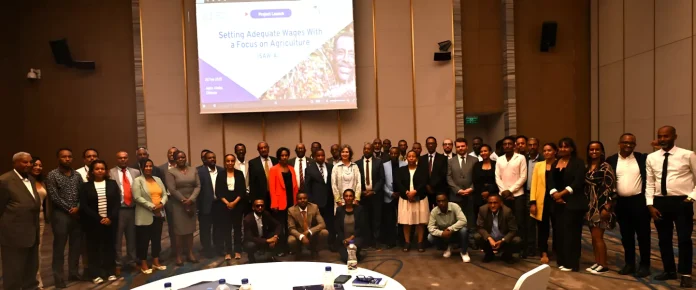The International Labour Organization (ILO), backed by the German Federal Ministry for Economic Cooperation and Development (BMZ), has launched the Setting Adequate Wages in Agriculture (SAW-A) Project in Ethiopia.
This transformative initiative aims to promote fair wage policies, strengthen collective bargaining, and establish minimum wage mechanisms, improving livelihoods in the agricultural sector.
Advancing Fair Wages and Social Justice
The launch event, held in Addis Ababa, brought together government officials, employers’ and workers’ organizations, development partners, and stakeholders committed to enhancing agricultural working conditions. Agriculture employs over 80% of Ethiopia’s workforce, making it crucial for economic growth. The SAW-A project is part of a global effort to ensure fair wages and sustainable incomes, especially in key sectors like coffee and horticulture.
READ ALSO: BATN Launches ₦27m Grant to Empower Youth in Agriculture
Khumbula Ndaba, ILO Country Director for Ethiopia, Djibouti, Somalia, Sudan, and South Sudan, emphasized the need for wage reforms in agriculture. “Social justice is not just a principle—it is a promise. Fair wages and decent work ensure that no one is left behind in the pursuit of economic progress,” Ndaba stated.
Ethiopia remains among the few African nations without a national minimum wage, leaving agricultural workers vulnerable. The SAW-A project seeks to address this by supporting statutory minimum wages based on reliable data, enhancing compliance with international labour standards, and aligning with the European Union’s Corporate Sustainability Due Diligence Directive (CS3D).
Building Stronger Wage-Setting Frameworks
Guillaume Delautre, SAW-A Project Manager, noted the project’s significance: “Fair wages are not just a moral imperative but an economic necessity. Ensuring agricultural workers receive appropriate wages will create a more resilient and productive agricultural sector.”
Dr. Tekalign Ayalew, CEO of Labour Affairs at the Ministry of Labour and Skills, highlighted the importance of tripartite partnerships. “A sustainable wage policy requires the collaboration of government, employers, and trade unions. Strengthening these partnerships will ensure that fair wages are implemented across all sectors, improving livelihoods nationwide,” he said.
The project’s three key outcomes include setting minimum wages based on economic and social indicators, equipping social partners for collective bargaining, and improving wage policy compliance. It will also explore living wages and incomes for smallholder farmers and self-employed workers.
Collaborative Path Toward Economic Stability
Employer and trade union representatives expressed strong support for the SAW-A project, emphasizing that fair wages are essential for social justice and economic stability. They reaffirmed their commitment to working together to achieve these goals.
A Transformative Future for Ethiopian Agriculture
The launch of the SAW-A project signals the beginning of a transformative journey toward fair wages and social justice in Ethiopia’s agriculture sector. The ILO and partners will continue conducting research, data analysis, and capacity-building initiatives to ensure fair and sustainable wage-setting mechanisms.
The ILO remains dedicated to collaborating with all stakeholders to ensure that economic progress in Ethiopia benefits every worker, leaving no one behind.
About the SAW-A Project
The Setting Adequate Wages in Agriculture (SAW-A) Project is a four-year initiative (2024–2028) funded by BMZ. Implemented in Ethiopia, Colombia, and Côte d’Ivoire, the project supports fair wage-setting mechanisms, strengthens collective bargaining, and promotes living wages and incomes in agricultural supply chains. SAW-A aligns with global labour standards and due diligence requirements, improving working conditions and ensuring economic sustainability.

